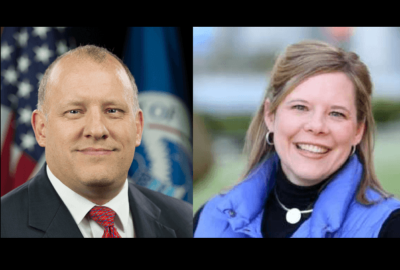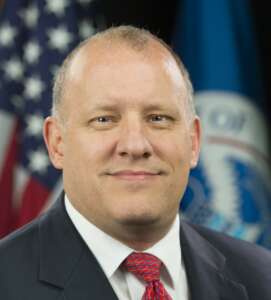
NSF’s unique R&D effort aims to solve societal challenges
Doug Maughan, the office head for the National Science Foundation’s convergence accelerator, said the agency will hand out $22 million in phase one research...
To help solve the challenges around climate change affecting the oceans and around the cybersecurity of communications systems, the National Science Foundation is taking a unique approach.
Through its convergence accelerator, NSF isn’t just funding research, but bringing together a broad group of experts with a goal of commercializing the innovations that come from this R&D.
Doug Maughan, the office head for the National Science Foundation’s convergence accelerator, said the office’s goals with its latest funding opportunities are to accelerate research efforts so they have the biggest societal impact possible.

“It requires a multidisciplinary team. This is the definition of the word convergence, which means multiple disciplines, multiple institutions and multiple types of institutions. So our expectation for someone responding to our solicitation is that they put together a team that includes industry, nonprofits, government, labs and academia. But it isn’t just a single discipline, and it isn’t just for a single institutional organization. So that’s a very different model than most are familiar with,” Maughan said in an interview with Federal News Network. “Additionally, it’s really taking basic research and moving it down the innovation pipeline toward commercialization. If you look at a Small Business Innovation Research (SBIR), for example, SBIR is a business already exists. It’s also a single company. In our case, because we have multiple institutions, that’s also very different. One of the other things that we talk about is sustainability. That means by the time they finished the three years, they have a sustainable solution. They could actually create a startup. They could create a nonprofit. They could create a consortium. They could do an open source project. They could license the intellectual property. So the idea is there are multiple paths for sustainability.”
Through the convergence accelerator, which began in 2019, NSF released both a traditional research funding announcement as well as a broad agency announcement about a month ago. The agency’s goal is to attract a wider group of participants ranging from nonprofits and academics to private sector companies.
Maughan, who joined the agency in 2019, said NSF plans to make 30 phase one awards of $750,000 each —15 for each track. Interested participants had to send a letter of intent to NSF by May 5 and their bids are due by June 14.
“Track E is called the networked blue economy. The idea here is to serve as a platform for developing innovative and interconnected tools and techniques, and also the human engagement with ocean resources. The projects will produce tangible product or processes or resources that will allow the U.S, and even more broadly, an opportunity to develop solutions for a more sustainable engagement with the ocean,” he said. “Our track F is called trust and authenticity and communication systems. This is aimed at developing a platform of tools and techniques and education to help us prevent, mitigate and adapt to threats in our communication environment. There’s certainly an urgent need for such a platform to determine the verifiability of different types of data, as we’ve had several instances even more, most recently, fake communications associated with the COVID response. It’s our belief that this Track F will provide new tools for trust and authenticity.”
A start-up inside NSF
Once bids are in, NSF reviews them and picks the 30 projects to receive phase one funding starting in September. The agency would make phase two awards a year later. Maughan said the amount of money that is available for phase two is unclear because it depends on several factors, including congressional funding.
“I like to remind people that we’re still a startup inside NSF. We’re two years old. But we’ve made some changes, obviously, with the pandemic. In our first year, our innovation curriculum was completely in person. This past year, it was completely virtual. So we had to change the entire curriculum to work in a virtual world,” he said. “We have also changed the amount of funding we provide the teams the first two years. We provided them with $1 million, and we’ve discovered that they were struggling to spend a million dollars in a year. This year we’ve cut the phase one funding down to $750,000. And we’ll see how that works. I think one of the other things that we’ve discovered is the reason we’re doing the BAA was the sooner we can get industry involved, the sooner we believe we can have solutions that will be more usable and sustainable.”
NSF launched the convergence accelerator in 2019 with two tracks focused on open knowledge networks, which is about data science and the future of work, analyzing how technologies like artificial intelligence and intelligent automation can impact the workforce. Research efforts are eight months into phase two, Maughan said.
“In our future of work track, we have a project that is led by Vanderbilt University looking at the neurodiversity workforce. They are looking primarily at autistic workers, so there are 4 million American adults with autism, and 80% to 90% of them are unemployed or underemployed. The Vanderbilt team is looking at producing technologies that will help autistic workers be better prepared for future jobs,” he said. “They’re also creating technologies to help employers be better positioned to hire autistic workers. If we could even be 25% successful, we could potentially impact the lives of a million Americans, when you think about bringing the neuro diversity workers into the job market. So that’s the types of impact we’re hoping to have.”
The 2020 tracks focused on quantum technology, which has 11 teams, and AI driven innovation through data and model sharing, which has 18 teams.
Interagency participation encouraged
Maughan said these teams will submit phase two proposals soon and NSF will be reviewing them in July.
Also in July, Maughan said NSF will hold its convergence accelerator expo, which is a virtual science fair of all of the current tracks and teams. It will be held July 28-29. Interested parties can virtually watch some of the videos the teams produce and talk to the teams about the research that they’re doing.
Maughan said other agencies can get involved in the convergence accelerator. He said they can be part of the teams that submit proposals for the tracks or they can provide NSF with resources and expertise to help review proposals.
“The Department of Labor is involved with the future of work. They’ve been actively engaged. We’ve got Department of Energy also involved. We’re still working on several others like the Department of Defense and [the National Institute of Standards and Technology],” he said. “We’ve already had conversations with [the National Oceanic and Atmospheric Administration] with respect to the network blue economy, that’s a big area for them. We’re still pretty new and still growing and still building a lot of partnerships ourselves across the government agencies.”
Copyright © 2025 Federal News Network. All rights reserved. This website is not intended for users located within the European Economic Area.
Jason Miller is executive editor of Federal News Network and directs news coverage on the people, policy and programs of the federal government.
Follow @jmillerWFED
Related Stories
In lab-to-market push, federal scientists urged to adopt ‘entrepreneurial mindset’




